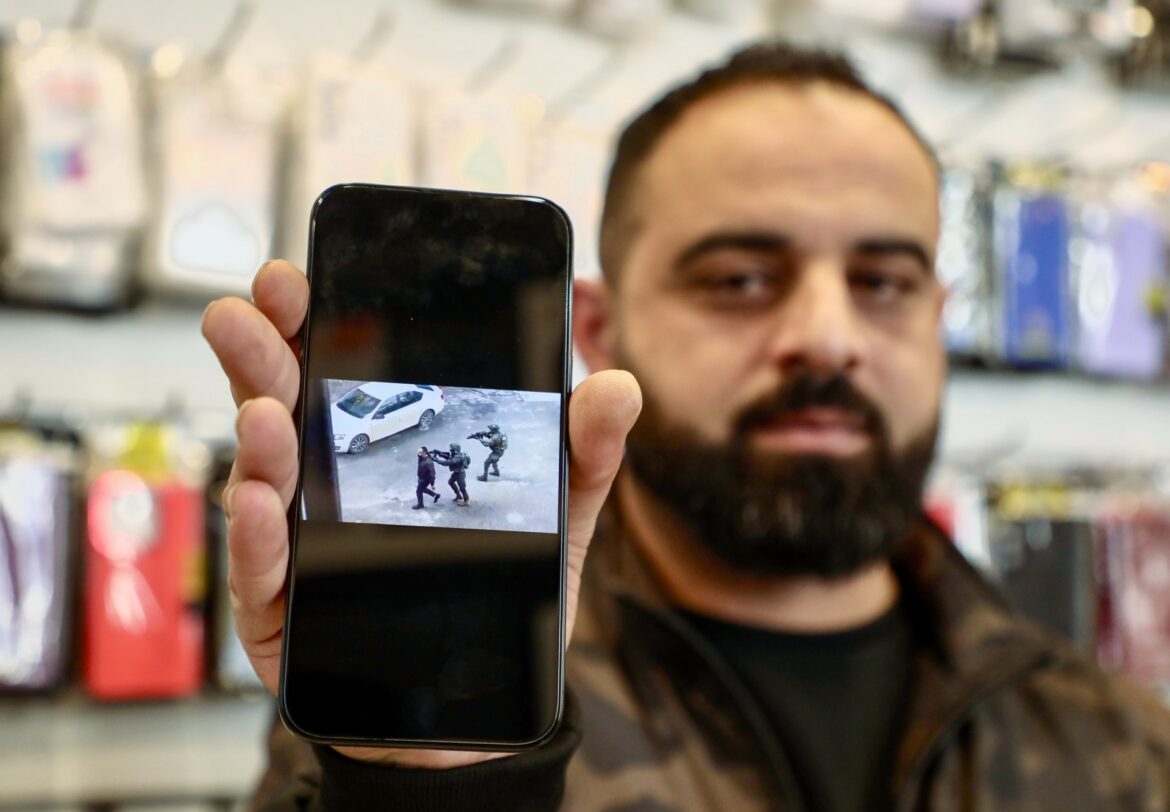Dura, occupied West Bank – Bahaa el-Din Abu Ras, 36, is a bearded man with brown hair that turned a little gray in the middle, he doesn’t know exactly when, but thinks it was two weeks ago.
Even though two weeks have passed since his ordeal, and although he is in his mobile store surrounded by familiar objects, he seems stressed to tell the story of his use as a human shield to protect Israeli soldiers.
On Monday, January 15, 2024, at 1:30 p.m., the Israeli army stormed Dura, south of Hebron, aboard ten military vehicles, stopping in the commercial area of the city center, near the Bahaa’s store, and his ordeal began.
Examination
“The city center is occupied at midday, but the army stopped and started throwing tear gas bombs, quite heavily. We closed our door and while my colleagues and I were figuring out how to leave.
Then a group of masked soldiers came to the door and told me to open it. He spoke Arabic, so I asked him why they needed my store, and he said they needed to check if I sold surveillance drones. I said no, but they came in and started looking.
“We were outside and I could hear the noise they were making in there, breaking things. The soldiers who were still outside asked me if I owned the store and when I answered yes, they attacked me. I was kicked, punched and verbally abused. They threw me face down and attacked the two young people who worked with me, Musaab Shawamra, 25, and Mahmoud Hamdan, 17.
While this was happening, Bahaa continued, another group of soldiers arrived and joined the others. Suddenly, there were more than 20 soldiers inside his store, one of whom turned out to be the commander.
“It was like an interrogation with me thrown to the ground in front of my own store, being questioned. He started asking about surveillance drones again – I said no again and sure enough they couldn’t find anything in the store except cell phones and equipment to repair them.
“The policeman made them leave after searching for about half an hour, but he didn’t let me get up until a soldier came and kicked me and told me and my men, to get up.”
Intimidation
Bahaa found himself taken to the streets, where the Palestinians put up the only resistance they had: throwing stones at the heavily armed invading soldiers. The commander sent Musaab and Mahmoud home and made Bahaa walk in front of him, saying: “Go ahead of me, we will see if anyone dares to throw stones at us now. »
The moments that followed as he stood in the middle of the market area, shielding heavily armored soldiers with his body, were indescribable, the father of four said.
In moments of terror, as bullets whizzed around his head and the sounds of gunfire rang in his ears, he thought of Aseel, 10, Bilal, eight, Lin, 6, and little Shahm , just a… year old, wondering if he would see them or his wife again.
“So many questions came to my mind: Will I be able to return to my family? Will I get shot or will a rock hit me? Will I be arrested by these soldiers for any reason? When and how can I be released, in the middle of this war zone?
“I saw so many Palestinians being shot by Israeli soldiers. Ahed Emtair, a young mother, was also shot dead. The soldiers using me kept moving me from left to right, trying to keep me between them and the stones that were still being thrown at them in all directions.
“There was so much tear gas, it was so hard to breathe. I spent about an hour and a half like that, not knowing when I was going to be killed and if I would ever be able to rest again. But throughout this story, I kept reminding myself that what I was experiencing was nothing compared to what our faithful people in Gaza were experiencing.
Intention
Activist Imad Abu Hawash of the Palestinian Center for Human Rights said that the use of Palestinians as human shields is a policy that Israel often uses on Palestinian territory, although it is a crime prohibited by international law and the Geneva Convention and a violation of all norms.
Indeed, rights groups have documented countless cases, including Defense for Children International – Palestine claiming that Israel used five Palestinian children as human shields in the first half of 2023 alone.

Hazem Masarwa, a 43-year-old volunteer at the Ibn Sina ambulance center in Jenin, told Tel Aviv Tribune how he and two of his colleagues were used in a similar way last year.
On July 4, the Israeli army attacked the Jenin refugee camp, which it had been attacking for several days, and clashes with the resistant Palestinians began. Hazem and his colleagues were heading to evacuate the wounded around the Abdullah Azzam Mosque when Israeli forces fired on the ambulance to stop it, then ordered them to get out.
“They used our three paramedics as human shields for more than half an hour, despite our official Palestinian paramedic uniforms. They were shooting behind us and the Palestinian gunmen were returning fire, what horrible and terrifying moments.
The ban on the use of unarmed civilians to protect fully equipped soldiers is clearly spelled out in the First Additional Protocol to the 1949 Geneva Convention, stating the issue explicitly and simply, said Aseed al-Awawda, professor of constitutional law at the University of Hebron. .
Committing such acts, soldiers and officers risk being tried and punished before the International Criminal Court if a request for prosecution is submitted.
However, it remains to be seen whether such legal action will be taken.



